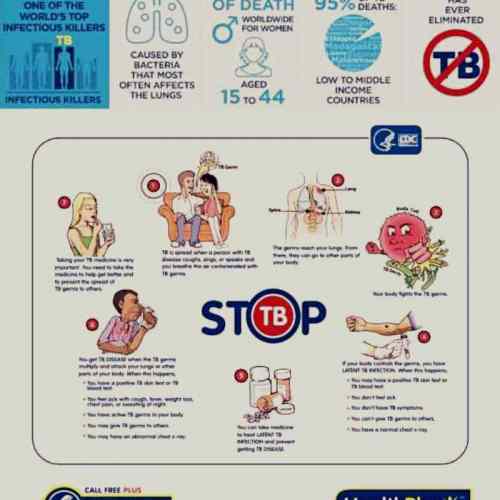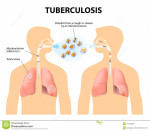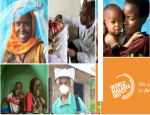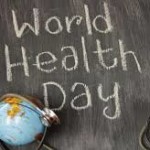World Tuberculosis Day, observed on 24th of March every year, is designed to build public awareness about the global epidemic of tuberculosis (TB) and efforts to eliminate the disease.
The theme of World TB Day 2018 – “Wanted: Leaders for a TB-free world”– focuses on building commitment to end TB, not only at the political level with Heads of State and Ministers of Health, but at all levels from Mayors, Governors, parliamentarians and community leaders, to people affected with TB, civil society advocates, health workers, doctors or nurses, NGOs and other partners. All can be leaders of efforts to end TB in their own work or terrain.
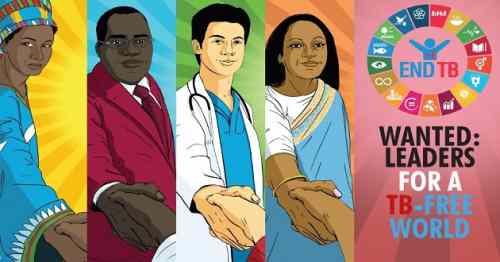
This call goes out to nations, healthcare workers and communities to rise and defeat this deadly disease responsible for 1.5 million deaths worldwide (9.6 million people fell ill) and over 200,000 deaths in Nigeria in 2014. The National TB and Leprosy Control Programme (NTBLCP) reported over 600,000 new cases of TB in Nigeria in 2014, with 91,354 cases placed on treatment. A lot can still be done to end this disease.
Nigeria is one of the countries on the WHO’s 22 highest-burdened TB countries list.
How is TB Contracted?
TB is caused by bacteria, Mycobacterium tuberculosis, that most often affects the lungs.
It is spread from person to person through the air. When people with TB cough, sneeze or spit, they propel the causative bacteria particles into the air. One needs to inhale only a few of these particles to become infected.
About one-third of the world’s population has latent TB, which means people have been infected by TB bacteria but are not (yet) ill with the disease and cannot transmit the disease.
People infected with TB bacteria have a 10% lifetime risk of falling ill with TB. However, persons with compromised immune systems, such as people living with HIV, malnutrition or diabetes, or people who use tobacco, have a much higher risk of falling ill.
When a person develops active TB disease, the symptoms (cough, fever, night sweats, weight loss etc.) may be mild for many months. This can lead to delays in seeking care, and results in transmission of the bacteria to others. People with active TB can infect 10-15 other people through close contact over the course of a year. Without proper treatment, 45% of HIV-negative people with TB on average and nearly all HIV-positive people with TB will die.
Who Is At Risk?
Tuberculosis mostly affects adults in their most productive years. However, all age groups are at risk
- Over 95% of cases and deaths are in developing countries
- Women & Children
- Tobacco use greatly increases the risk of TB disease and death. More than 20% of TB cases worldwide are attributable to smoking
- People who are infected with HIV and other immunity-impairing disease conditions are 20 to 30 times more likely to develop active TB
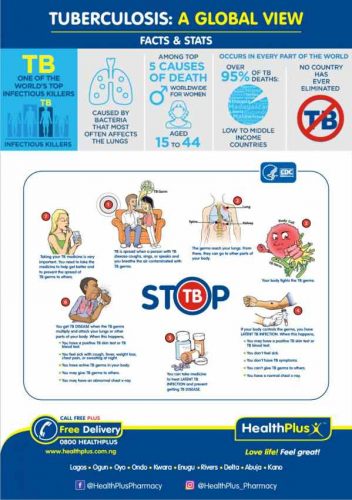
What are the Signs and Symptoms?
Signs and symptoms of active TB include:
- Coughing that lasts three or more weeks
- Coughing up blood
- Chest pain, or pain with breathing or coughing
- Unintentional weight loss
- Fatigue
- Fever
- Night sweats
- Chills
- Loss of appetite
Tuberculosis can also affect other parts of your body, including your kidneys, spine or brain. When TB occurs outside your lungs, signs and symptoms vary according to the organs involved. For example, tuberculosis of the spine may give you back pain, and tuberculosis in your kidneys might cause blood in your urine.
When to see a doctor
See your doctor if you have a fever, unexplained weight loss, drenching night sweats or a persistent cough. These are often signs of TB, but they can also result from other medical problems. Your doctor can perform tests to help determine the cause.
Can TB Be Treated?
The good news is TB is preventable and curable. It can be treated! Early diagnosis and treatment is key.
How Can We Prevent TB? Let’s Make The Pledge To Stop TB Today!
Let’s pledge to:
- To take our infants and children under 15 who have never received the BCG vaccine for BCG vaccina-
tion. These are available nation-wide in private and government healthcare facilities - Stop Smoking
- Practice safe sex habits such as abstinence or the use of latex condoms
- Practice personal hygiene habits such as:
- covering your mouth when coughing
- Washing your hands before and after meals, and after using the bathroom
- Dispose of waste properly
- Go for routine check-up especially when there are related signs and symptoms
- Encourage our loved ones to seek medical and professional help when signs and symptoms exist.
- Ensure that children avoid being around adults who have TB
Read Also- [Top 10 Questions About Tuberculosis]
